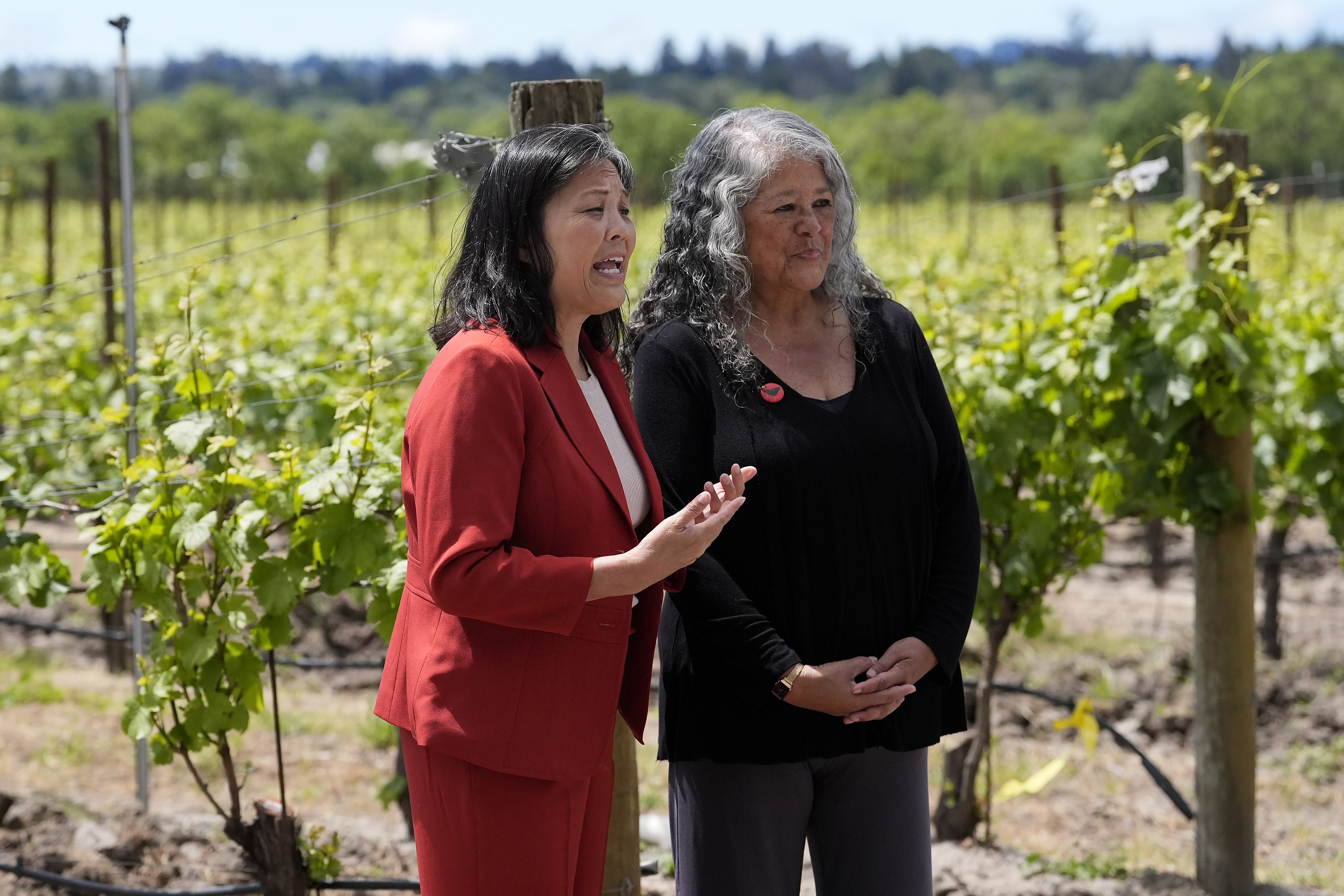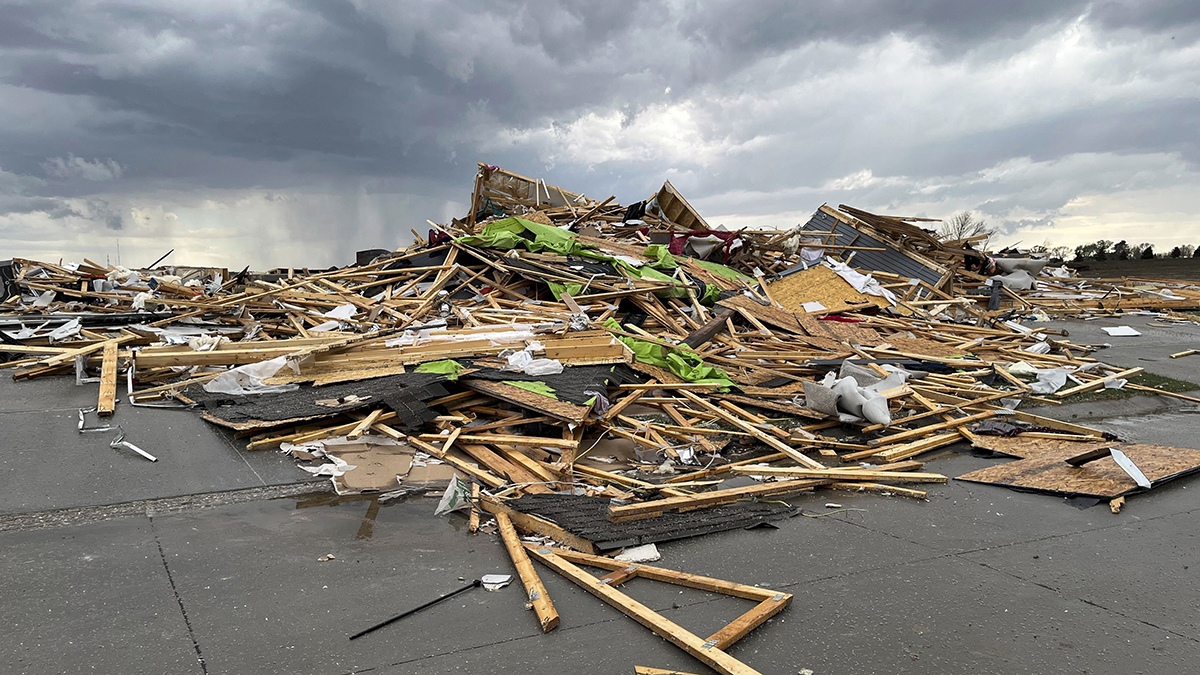Russian President Vladimir Putin said after his summit with Kim Jong Un Thursday that the North Korean leader is ready to proceed toward denuclearization — but needs solid security guarantees to do so.
Putin said that he will be willing to share details of the summit with U.S. President Donald Trump, adding that "there are no secrets." He noted that Kim himself encouraged him to explain certain nuances of Pyongyang's position to Trump.
The summit on Russky Island, across a bridge from the far-eastern port city of Vladivostok, reflected Russia's effort to emerge as an essential player in the North Korean nuclear standoff, a role that would raise Moscow's global clout and its leverage with Washington.
Putin emphasized that the North Korean leader is ready to move toward a nuclear-free status but would only proceed when he gets solid guarantees. He did not, however, specify what those guarantees would look like. "Above all, he focuses on protecting national interests and security," Putin said.
Earlier in the day, Putin voiced confidence that Kim's visit will "help better understand what should be done to settle the situation on the Korean Peninsula, what we can do together, what Russia can do to support the positive processes going on now."
Kim's meeting with Putin follows a year of intense diplomacy the North hopes will help it get out from under international sanctions over its nuclear weapons and long-range missile programs. Kim has already held four summits with Chinese President Xi Jinping, three with South Korean President Moon Jae-on and two with President Donald Trump.
Kim's second summit with Trump in February ended without any agreements, and his trip to Russia reflects his desire to put more pressure on Washington and show some independence from Beijing as well.
U.S. & World
The day's top national and international news.
For Putin, the meeting offers a chance to increase his role as a potential broker. He immediately emphasized that he was willing to share details of the talks with Trump.
The Russian leader emphasized that Moscow and Washington both want Pyongyang to denuclearize. When he sat down for talks with Kim, he praised him for engaging in dialogue with the U.S.
"We welcome your efforts to develop an inter-Korean dialogue and normalize North Korea's relations with the United States," Putin told Kim.
Following their one-on-one meeting at the start of broader talks involving officials from both sides, Putin and Kim said they had a good discussion.
"We discussed the situation on the Korean Peninsula and exchanged opinions about what should be done to improve the situation and how to do it," Putin said. Kim described the talks as "candid and meaningful."
"The reason we visited Russia this time is to meet and share opinions with your excellency, President Putin, and also share views on the Korean Peninsula and regional political situation, which has garnered the urgent attention of the world, and also hold deep discussions on strategic ways to pursue stability in the regional political situation and on the matters of jointly managing the situation," Kim said.
Looking confident but a bit stiff, Kim also congratulated the Russian leader on his re-election to another six-year term last year.
"Ceaselessly bolstering and developing strategic and traditional relations between North Korea and Russia ... is my and my government's firm and unwavering position," Kim said later at a state banquet, where he made a toast.
Since the Trump-Kim talks in February ended without a deal because of disputes over U.S.-led sanctions, there have been no publicly known high-level contacts between the U.S. and North Korea — although both sides say they are still open to a third summit.
Kim wants the U.S. to ease the sanctions to reciprocate for some partial disarmament steps he took last year. But the U.S. maintains the sanctions will stay in place until North Korea makes more significant denuclearization moves.
North Korea has increasingly expressed frustration at the deadlocked negotiations. Last week, it demanded U.S. Secretary of State Mike Pompeo be removed from the talks and strongly criticized national security adviser John Bolton.
In Seoul, President Moon said Thursday he'll try to hold a fourth summit with Kim and facilitate the resumption of U.S.-North Korea talks.
Kim arrived in Vladivostok Wednesday aboard his private train and offered what is possibly his first interview ever with a foreign media outlet. He told Russian state television that he was hoping that his first visit to Russia would "successful and useful." He evoked his father's "great love for Russia" and said that he intends to strengthen ties between the two countries. The late Kim Jong Il made three trips to Russia, the last time in 2011.
Like the U.S., Russia has strongly opposed Pyongyang's nuclear bid. Moscow was part of six-nation talks on the North Korean standoff that fell apart after Pyongyang's withdrawal in 2009.
Putin said he wasn't sure if the talks could be revived, but he emphasized that international involvement will be needed to discuss guarantees for Pyongyang.
Dmitri Trenin, the director of the Carnegie Moscow Center, said ahead of Thursday's talks that Putin will likely encourage Kim to continue constructive talks with the U.S., reflecting Russia's own worry about the North nuclear and missile programs. "Russia can't be expected to side with North Korea and, let's say, support the North Koreans all the way in the Security Council," he said.
Trenin said Moscow doubts the North could be persuaded to fully abandon its nuclear weapons, considering that a "mission impossible."
"North Korea will not give up the only guarantee of the survival of the North Korean state and its regime," Trenin said.
Russia would also like to gain broader access to North Korea's mineral resources, including rare metals. Pyongyang, for its part, covets Russia's electricity supplies and investment to modernize its dilapidated Soviet-built industrial plants, railways and other infrastructure.
Vladivostok, a city of more than half a million on the Sea of Japan, faced gridlock on its roads as traffic was blocked in the city center due to Kim's visit.
The authorities have temporarily closed the waters around Russky Island to all maritime traffic.
Kim was expected to return to Pyongyang on Friday.
Associated Press writers Hyung-jin Kim and Kim Tong-hyung contributed to this report.



